Eye care method properly after surgery
Eye surgery is extremely important, no matter what the cause. The time it takes for your eyes to recover depends on the type of surgery and the body of each person. However, whether cataract surgery, retina, cornea or any other type of surgery, you must also take time to rest your eyes and recover properly. Here is the right eye care method after surgery. Invite you to consult!
- 8 signs of abnormal eye warning about your health
Part 1: Eye protection
1. Avoid putting water in your eyes
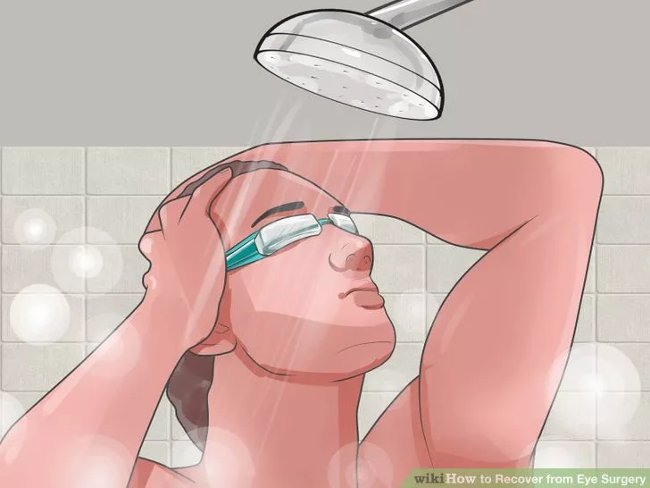
You may like to splash water on your face because it feels so good, but this action can cause infection and make your eyes feel more uncomfortable after surgery. However, the time to avoid water in eyes may vary depending on the type of surgery. For example, you should wear eye protection when showering for one week after LASIK ( Laser In-situ Keratomileusis ). So talk to your doctor for more specific instructions.
- Of course, this does not apply to all eye surgeries, so consult your doctor.For example, a little water in the eye after a retinal surgery a day may not be a problem.
- It is gentle when drying your face.
2. Adjust your washing habits
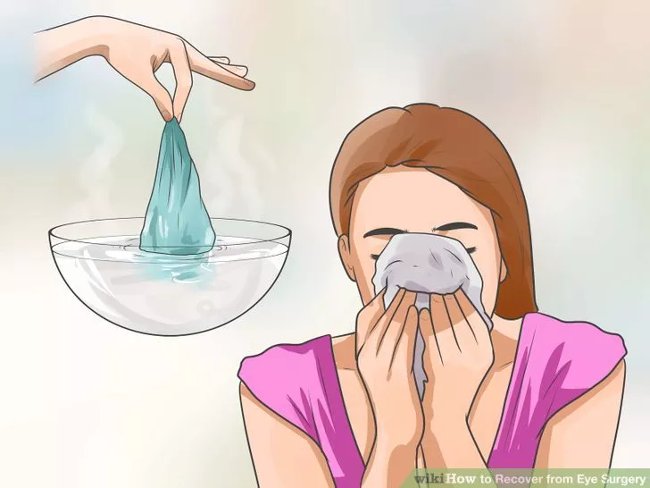
Instead of washing your face by patting the face with water, wet the face towel and gently wipe it. Showering right after surgery can be risky because you have to avoid getting water on your eyes ( except for retinal surgery ). Therefore, unless authorized by a doctor, it may be safer to take a bath because water only submerges to the neck. When you want to wash your hair, you should tilt your head back to wet your hair while keeping your face dry, avoiding water in your eyes.
3. Avoid using cosmetics around the eyes
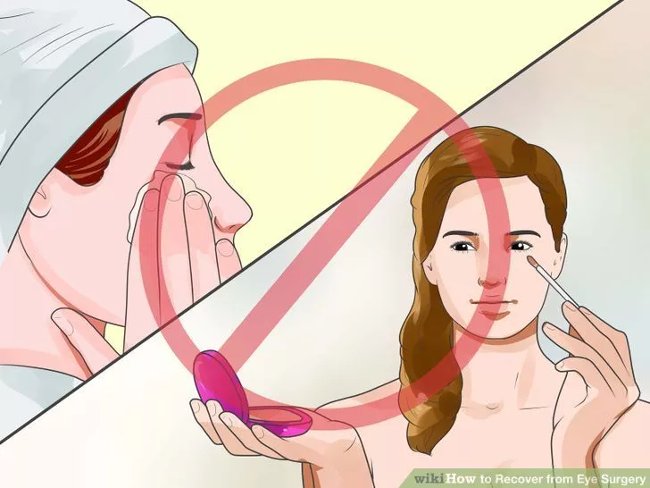
Do not apply any foreign substances on the face around the eye area before getting permission from your doctor, not just cosmetics, but all essential oils and lotions you still apply to your face. Because these products cause eye irritation, it can lead to infection and eye damage.
- Of course, you can still use lipstick or lip gloss but avoid all types of cosmetics that can get into your eyes.
4. Protect the eyes from direct sunlight from the sun

After surgery, your skin will not be able to adapt quickly to outside light. Especially when exposed to strong light, your eyes may be sore and extremely sensitive to light. Therefore, avoid anything that can strain your eyes.
- When going out during the day, you need to wear eyeglasses at the time recommended by the surgeon.This period can range from three days to a week, but depends on the type of surgery.Follow your doctor's instructions.
5. Wear eye mask when sleeping
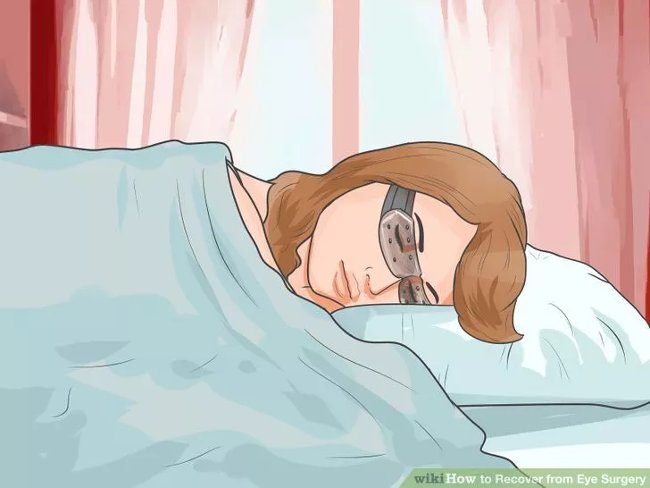
In some cases, your doctor may advise you to wear an eye mask when sleeping for a few days to two weeks after surgery. This is to prevent you from rubbing your eyes while you sleep.
6. Avoid smoke and dust
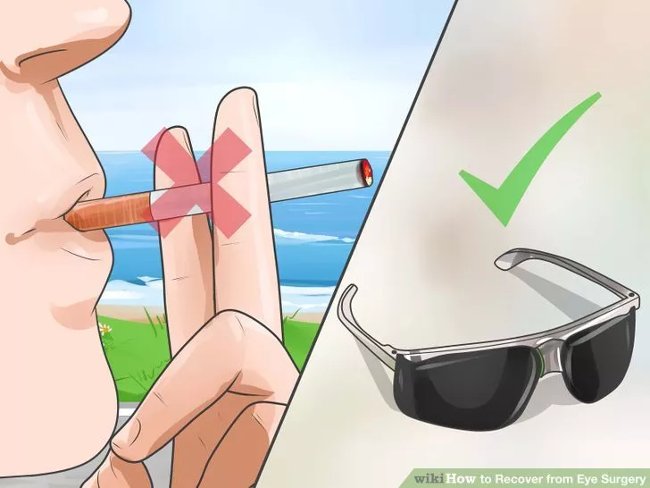
Within at least one week after surgery, all irritants can be a source of infection. Wear goggles if there is a risk of dust entering your eyes. In particular, smokers should try to stop smoking for at least a week, while wearing protective goggles and try to avoid exposure to smoke.
7. Do not rub your eyes
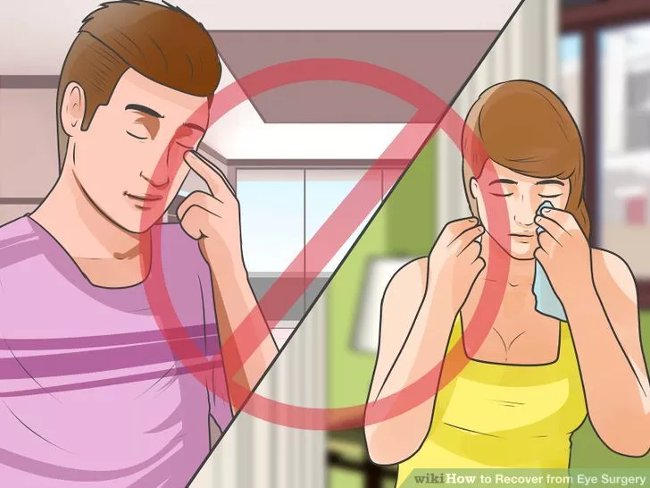
Maybe your eyes will itch after surgery, but try to resist the reflex to rub your eyes. This action can harm the delicate incision and surface of the eye. Moreover, bacteria from the hands can spread easily to the eyes.
- Usually, your doctor will provide you with eye protection such as gauze or goggles.You can remove them for small eye drops prescribed by your doctor.
- Be sure to use eye protection while your doctor recommends it.Be careful when sleeping, do not let your eyes get pinched and hold your posture as advised by your doctor.
8. Preventing bacteria
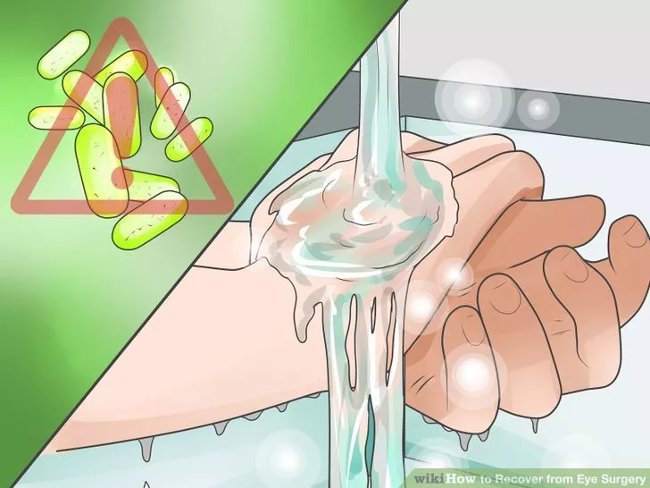
Wash your hands every time you are at risk of exposure to bacteria: outdoors, bathing, walking, etc. Also, do not go to crowded places for the first few days after surgery. Because if you stay at home,you can reduce exposure to germs.
9. Contact your surgeon immediately if serious symptoms occur
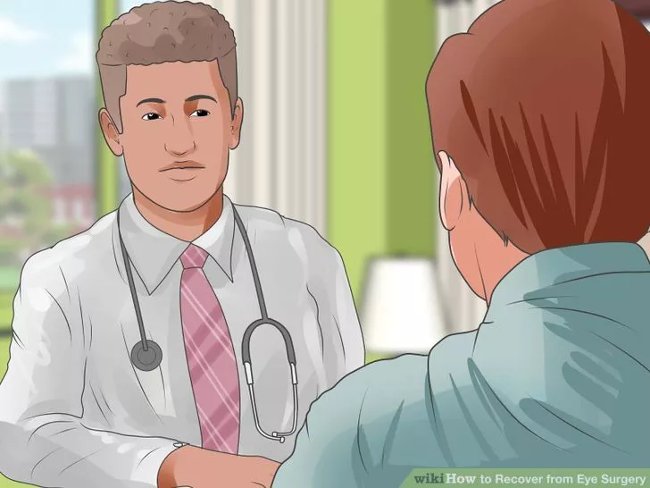
Be sure to tell your doctor about the symptoms after surgery and go back to your appointment on time to limit possible problems. If you experience any common symptoms after surgery but persist for a long time, you should talk to your doctor right away. In addition, you can record the time symptoms begin to appear. Immediately tell your doctor if you have any of the following serious symptoms:
- With cataract surgery : Increasing pain, loss of vision or glare / seeing black spots before the eyes.
- With LASIK surgery ( corrective surgery for refractive errors ): The pain increases gradually or vision decreases for several days after surgery.
- With retinal detachment surgery : You may initially see glare after surgery, but this phenomenon gradually disappears.If new flare light appears, the sight of flying black spots increases or your vision is lost, you should immediately contact your doctor.
- For all types of surgery : Increased pain, bloody fluid or loss of vision.
10. Take care of yourself

To stay healthy after surgery, apply a balanced menu of protein, fruits, vegetables, whole grains, milk and fruit juices. Besides, drink plenty of water to help the wound heal. The Institute of Medicine recommends that men drink 13 cups ( 3 liters ) of water, and women should drink 9 cups ( 2.2 liters ) of water every day.
11. Take vitamin supplements

Although it is not a substitute for a daily balanced menu, multivitamins can help replenish the body with nutrients. In particular, vitamin C can support the healing process; Vitamin E, lutein and zeaxanthin protect new tissues from harmful free radicals and vitamin A needed for vision. According to the US Food and Drug Administration, the recommended daily dosage is as follows:
- Vitamin C: 90mg for men;75mg for women;Add 35mg for smokers.
- Vitamin E: 15mg of natural vitamin E or 30mg of synthetic vitamin E.
- Lutein and Zeaxanthin: 6mg.
12. Limit contact with computer screens

The doctor will give specific instructions about when you are allowed to come into contact with the computer screen, depending on the nature of the surgery and your recovery situation. For example, you should not look at any screen after LASIK surgery. Talk to your doctor about the time limit for computer screen exposure depending on your situation.
Part 2: Take the medicine properly
1. Use eye drops as directed
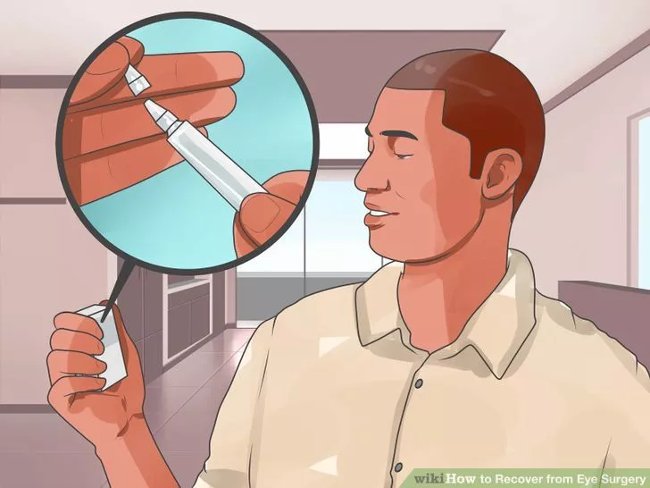
Usually, the doctor will prescribe one or two eye drops: antibacterial or anti-inflammatory drugs. Antibacterial eye drops to fight infection, and anti-inflammatory eye drops to fight inflammation. If you have difficulties with eye care, ask a friend or family member for help.
- In addition, your doctor may prescribe ophthalmic eye drops like atropine to prevent scar formation in the pupils and relieve pain.Or, eye drops may be indicated to help reduce the pressure in the eye, especially if the eye is injected with gas or oil.
2. Look up eye drops
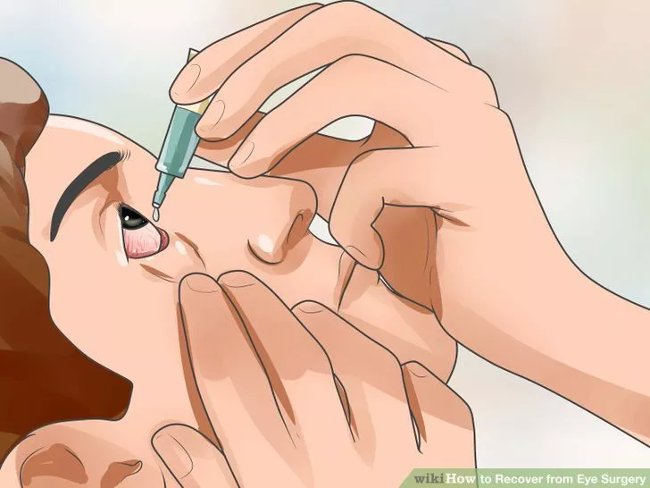
First, tilting your head back, your eyes look straight at the ceiling to keep from blinking. Then, use a finger to pull the lower eyelid downwards and put the medicine on it. Close your eyes but don't rub. Wait at least 5 minutes before starting another medicine.
- Avoid putting the tip of the eye drops into your eyes.
3. How to check eye ointment
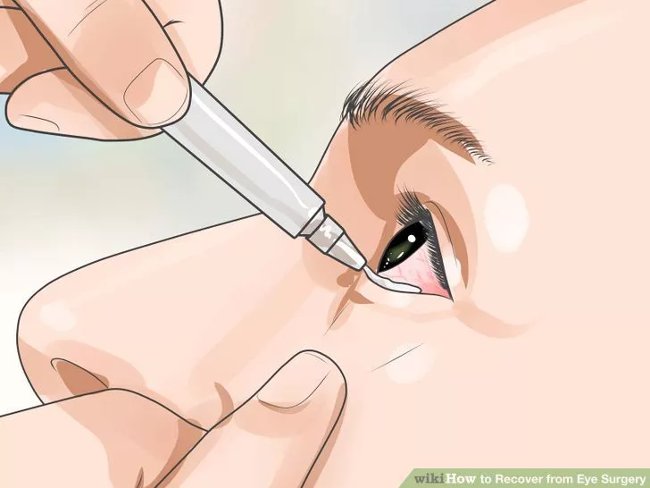
Examination of ointment is like investigating eye drops. First, tilt your head back and gently pull down the lower eyelid, upside down the vial and gently squeeze the ointment into the eye. After that, close your eyes for about a minute for the ointment to penetrate your eyes and start working.
4. Wash your eyes according to your doctor's instructions
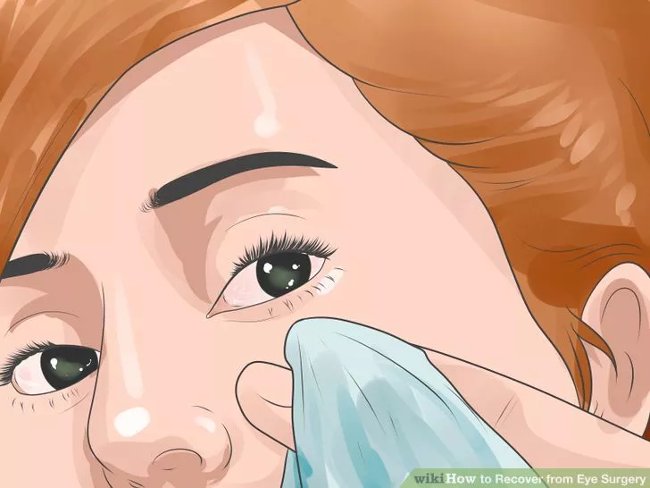
Doctors often instruct to wash around the eyes twice a day. You can boil water, keep it warm, and dip a clean towel in the water to disinfect it. Wash your hands, then gently wipe the upper eyelid, lower eyelids and eyelashes. Remember to wipe the corners of your eyes.
- Remember to wash towels in boiling water or use a new and clean towel for each wash.Towels must be sterile because the eyes are very susceptible to infection after surgery.
Part 3: Return to normal life
1. Join some gentle activities

You can exercise gently when you get home after surgery. However, heavy activities like weightlifting, jogging, cycling or swimming need to be avoided by a doctor's instructions. Weight lifting and muscle tension will increase eye pressure, which can slow down the healing process and even damage healthy tissue.
- Ask for help when you have to do heavy work.Your friends and family members will be happy to help and be happy when you recover quickly.
2. Drilling sex
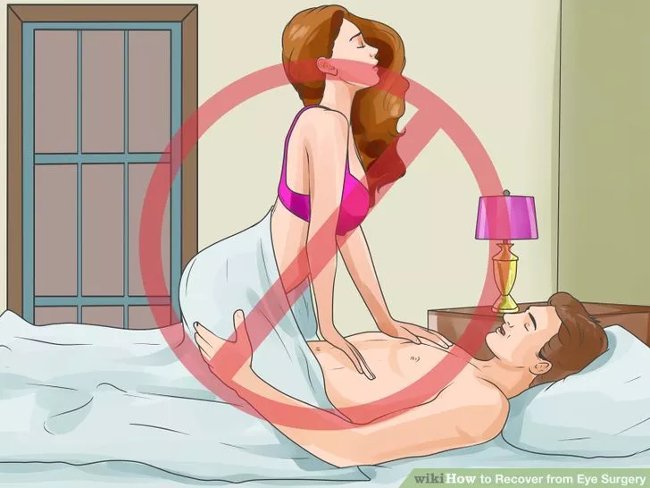
Just like exercise, you should drill back to sexual activity. Any exertion can put pressure in the eye, slowing the recovery process.
3. Do not drive right after surgery

After surgery, it is often blurred, which can be dangerous while driving. Therefore, you should avoid driving until your eyesight recovers or when your doctor gives you permission. In general, you can start driving again when your eyes are focused and no longer sensitive to light.
- Make sure someone takes you home after surgery.
4. Ask your doctor when you can return to work

The recovery time depends on the type of surgery and the ability of each person to recover. Some types of surgery require up to 6 weeks to recover. In contrast, cataract surgery requires only about a week of recovery time.
5. Avoid alcoholic drinks during recovery

A glass of wine to improve your mood does not seem to be harmful, but actually alcohol increases the tendency to build up fluid in your body. Fluid build up in the eye can also increase pressure on the eyes. This will slow down the recovery process or cause further eye damage.
Part 4: Recovery after eye surgery
1. Rest at least 24 hours after cataract surgery
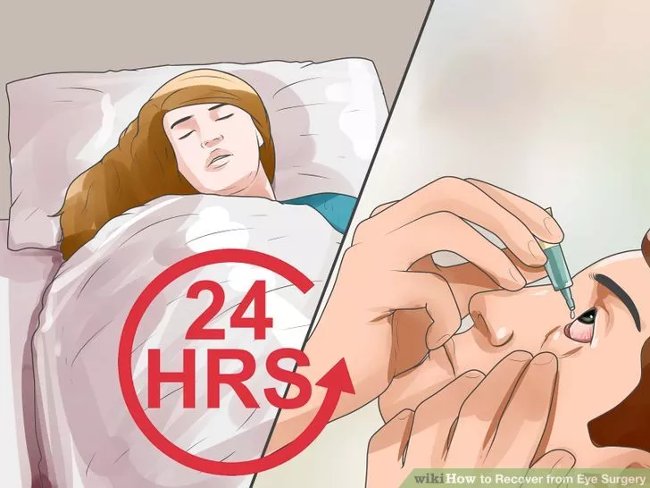
Cataract surgery removes cloudy lenses ( opaque membranes ) that often develop with age. The surgeon will place artificial intraocular lenses in the eye. Patients often complain about the feeling of " foreign objects " in their eyes after cataract surgery. This phenomenon is often a symptom of dry eyes due to stitches, because antiseptics used before surgery lead to abnormal dry irritation or dry eye condition during surgery.
- Nerves usually take several months to heal, during which time you may have a strange feeling in your eyes.
- To deal with these symptoms, your doctor may prescribe eye drops for lubrication and antibiotics to prevent infection.
2. Retinal surgery surgery
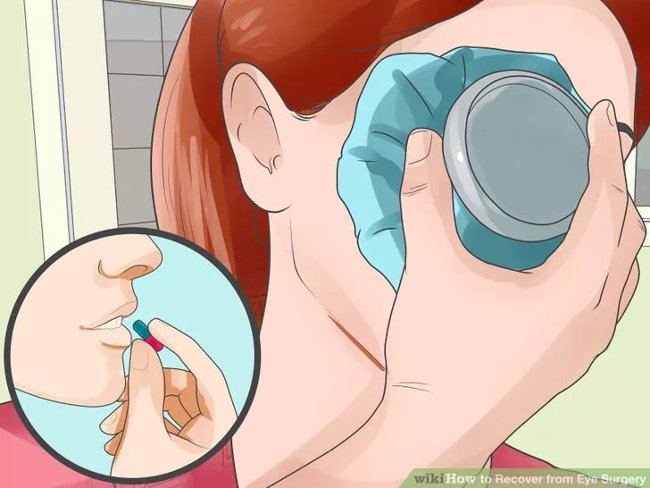
Symptoms that cause you to have surgery may take some time after retinal detachment surgery, but will gradually disappear. Retinal surgery is necessary to avoid blindness. In addition, these symptoms include painless vision loss, such as the feeling of having a covering in front of the eyes; dazzle or see light at the corner of the eye; and suddenly a lot of black spots appear before your eyes.
- Retinal detachment surgery requires recovery time of about one to eight weeks.
- After the surgery, it may be a little painful, but it can be treated with over-the-counter pain relievers or ice packs.
- The phenomenon of black spots flying in front of the eyes or seeing the light flaring will gradually disappear.Contact your doctor immediately if you notice flare-up of light that does not occur before surgery.
- You can also see black or silvery white streaks in sight.This phenomenon is caused by air bubbles that accumulate and disappear when the air gradually absorbs into the eye.
3. Recovery after LASIK surgery

Although the time for LASIK surgery is short, the recovery time can last from 2 to 3 months. LASIK is a surgery for people with refractive errors who have to wear glasses or use contact lenses. This type of surgery uses a laser to alter the curvature of the cornea, which helps the patient see better. After surgery, you may have more tears in your eyes, see the halo or the image is blurry. In addition, feeling burning or itching, it is important that you try not to touch your eyes. If the symptoms become too uncomfortable, report it to your doctor.
- The doctor usually recommends follow-up within 24-48 hours after the surgery to check for vision and infection status.Tell your doctor about any pain or side effects, if possible, and arrange for follow-up visits.
- Gradually return to daily activities, but must follow the doctor's instructions.You can apply makeup and apply lotion on your face after two weeks.After four weeks can participate in strong activities and contact sports.
- Avoid rubbing your eyelids, taking hot baths or whirlpools for about 1-2 months or for the time recommended by an eye care specialist.
Refer to some more articles:
- 3 natural ways to enhance your vision effectively
- Explain why our eyelids sometimes twitch?
- Streaks on nails can be a warning sign for melanoma
Having fun!
You should read it
- ★ The doctor had his own appendix surgery between Antarctica, the historic operation that made the whole world admire
- ★ Warning: Complications from thyroid cancer surgery are increasing
- ★ Liver surgery is rare in newborns
- ★ Obese patients are less likely to die after heart surgery than normal people
- ★ Successful Chinese professor of surgical surgery implanted the first person on the corpse